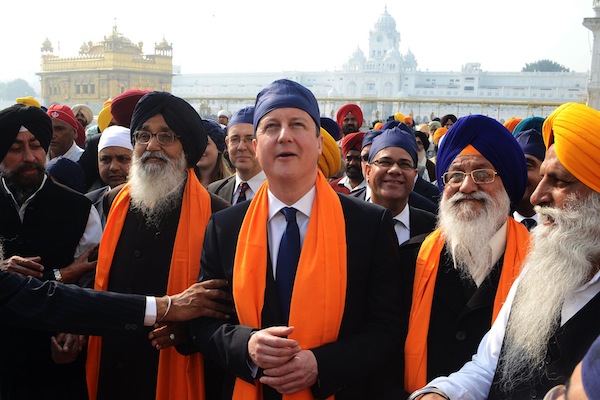How did David Cameron fare with the local media on this week’s trip to India? The third day of his trip attracted the most headlines, when he visited Amritsar. If Mr Cameron, described as ‘Mr Camerooon’ by one enthusiastic TV journalist, and reportedly introduced as James Cameron by another, didn’t have a high profile amongst Indians at the start of his trip, this one act ensured otherwise.
After he’d talked trade with business leaders, met a Bollywood star and performed the obligatory cricket photo opp, he headed to Amritsar, to Jallianwala Bagh, the scene of a massacre which is etched in India’s history.
It was here, in 1919, that hundreds of Indians were shot dead by British troops, under orders from General Dyer. David Cameron’s decision to become the first British Prime Minister to visit the site, and his subsequent description of what happened as ‘a deeply shameful event in British history’ was enough to exercise the Indian media.
Should he have gone? Should he have gone further and apologised for what happened? Should the Kohi-noor diamonds now be returned?
A picture of him kneeling in front of the memorial was carried on the front page of most of the newspapers, ‘The apology that wasn’t,’ was the headline in the Times of India. ‘Stopping short of a full apology has not impressed historians,’ wrote the paper.
The TV channels rolled on the visit to Jallianwala Bagh. ‘It was a graceful trip, but others say an apology would be more graceful,’ said a reporter as he went live from Amritsar. ‘His visit was meaningless,’ said the relative of someone who died in the massacre.
Some did welcome Mr Cameron’s efforts to pay his respects, but his motives were heavily questioned. The Hindustan Times said it was pure electioneering: ‘The gesture as well as the entire Amritsar visit, coming at the end of his three-day trip to drum up trade and investment, is seen by many as an attempt to court around 1.5 million British voters, ahead of a 2015 election,’ said the paper.
For others the decision to visit the site opened up pent up colonial sentiments, one panelist on a TV show went even further, ‘Even God wouldn’t trust the British in the dark, why don’t we mock them instead of discussing this apology,’ he said furiously.
The primary purpose of Mr Cameron’s visit, the largest trade delegation of its kind, was to boost business between the two.
‘Without mincing words, it should be noted that Britain is now a diminishing power whereas India is a growing power,’ read the editorial in the Free Press Journal, which also lauded UK efforts to improve ties.
A separate Hindustan Times editorial argued that British policy on student and business visas (the latter which Mr Cameron has promised to speed up) was slowly severing migration links which had been a strong part of the relationship.
The trip showed how much and how little has changed between the two nations. India no longer sees Britain through a prism of Enid Blyton novels, wrote one newspaper, but in some senses, it still clings on to the past, a fact Mr Cameron has had to contend with while here.
Rajini Vaidyanathan is a broadcaster, writer and presenter based in Mumbai.






Comments